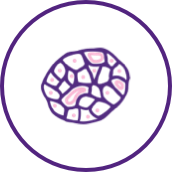Type 1 diabetes
Vertex is focused on discovering, developing and producing innovative medicines so people with serious diseases can lead better lives. Our scientists don’t see the impossible as an obstacle; they see it as a good place to start.

Vertex is focused on discovering, developing and producing innovative medicines so people with serious diseases can lead better lives. Our scientists don’t see the impossible as an obstacle; they see it as a good place to start.
About type 1 diabetes (T1D)
What is type 1 diabetes? T1D is a lifelong disease caused by the autoimmune destruction of insulin-producing islet cells (beta cells) in the pancreas. Insulin is a hormone that the body needs to metabolize glucose (blood sugar), a key source of energy. Without insulin, no cell in the body can use or store glucose normally. The destruction of islet cells leads to a loss of insulin production and abnormal glucose regulation, often leading to high glucose levels in the blood, known as hyperglycemia. Due to these high blood sugar levels, people with T1D develop symptoms including increased thirst or hunger, frequent urination and unexplained weight loss. Unable to use blood glucose for energy, the body will attempt to compensate by breaking down muscle and fat, leading to muscle wasting and the buildup of ketones in the blood, which becomes toxic. This can result in diabetic ketoacidosis, which can be life-threatening.
Living with T1D requires lifelong treatment with insulin. People with T1D need to give themselves multiple injections of insulin per day or use an insulin pump that is attached to the body. They must also check their blood sugar levels frequently and manage their diet and exercise closely. There’s a delicate balance between too much insulin and not enough insulin. Without enough insulin, uncontrolled high blood sugars can, over time, lead to complications such as kidney disease, eye disease (including vision loss), nerve damage and even death. Too much insulin can cause low blood sugar, which can lead to symptoms of severe hypoglycemia like loss of consciousness, coma or even death.
A minority of patients have been made free of insulin therapy with a transplant of insulin-producing cells (pancreatic islets) from organ donors. This procedure has been studied around the world and requires treatment with anti-rejection medication to prevent rejection of the donor islets.
How is type 1 diabetes diagnosed? T1D is often diagnosed when people develop the characteristic symptoms of increased thirst/hunger, frequent urination and unexplained weight loss. Blood tests are used to assess blood sugar levels and confirm the diagnosis. This type of diabetes used to be known as “juvenile-onset diabetes” or “insulin-dependent diabetes” but can be diagnosed at any age.
What is the underlying cause of disease? In T1D, the body’s own immune system destroys the beta cells in the pancreatic islets, leading to a loss of insulin production. When beta cells function normally, they produce insulin to respond to increases in blood sugar (e.g., after eating) and maintain normal blood sugar (e.g., during sleep and between meals). Without enough beta cells to make insulin, blood sugar levels are not regulated, and this leads to symptoms and long-term complications. Genetic and environmental factors are thought to play a role in the development of T1D, but the exact triggers for autoimmune beta cell destruction are not known and may vary between people.
The Vertex approach
We’re investigating and advancing cell therapies aimed at treating an underlying cause of T1D — the absence of insulin-producing cells. For over 100 years, improvements in insulin and technologies for insulin management have helped people with T1D manage their condition. However, there are very few approved treatments that address a root cause of T1D — the absence of insulin-producing cells in the pancreatic islets.
Our investigational approach is to replace the insulin-producing cells that have been destroyed in people with T1D. We’re evaluating multiple approaches to deliver our proprietary, fully-differentiated, insulin-producing cells. One approach, zimislecel (formerly known as VX-880), aims to deliver insulin-producing cells via infusion into the hepatic (liver) portal vein, and requires the ongoing use of anti-rejection medication to ensure immune cells don't attack transplanted cells. A second approach encapsulates these same cells in a device to be surgically implanted in the body. These devices are designed with the aim of shielding the cells from the body's immune system. This approach is being investigated without the use of anti-rejection medication, which may allow the investigational therapy to reach additional people with T1D. Additional preclinical research is investigating the development of hypoimmune cells, using gene editing to help the islet cells evade the immune system.
Pipeline
These programs are investigating treatments or outcomes that have not received approval from a health authority. The information presented is not intended to convey conclusions of safety or efficacy. There is no guarantee that the outcome of these studies will result in approval by a health authority.
Our studies
For more information about our type 1 diabetes studies in the U.S., visit our clinical trials website. For information about non-U.S. sites, visit clinicaltrials.gov.


